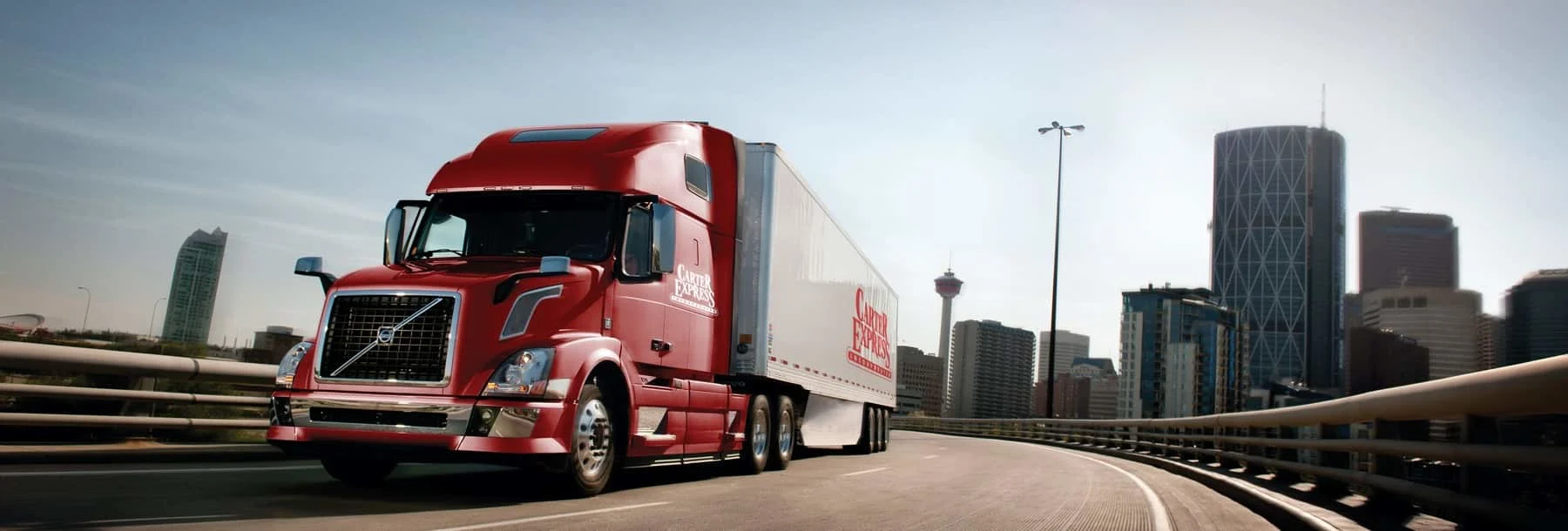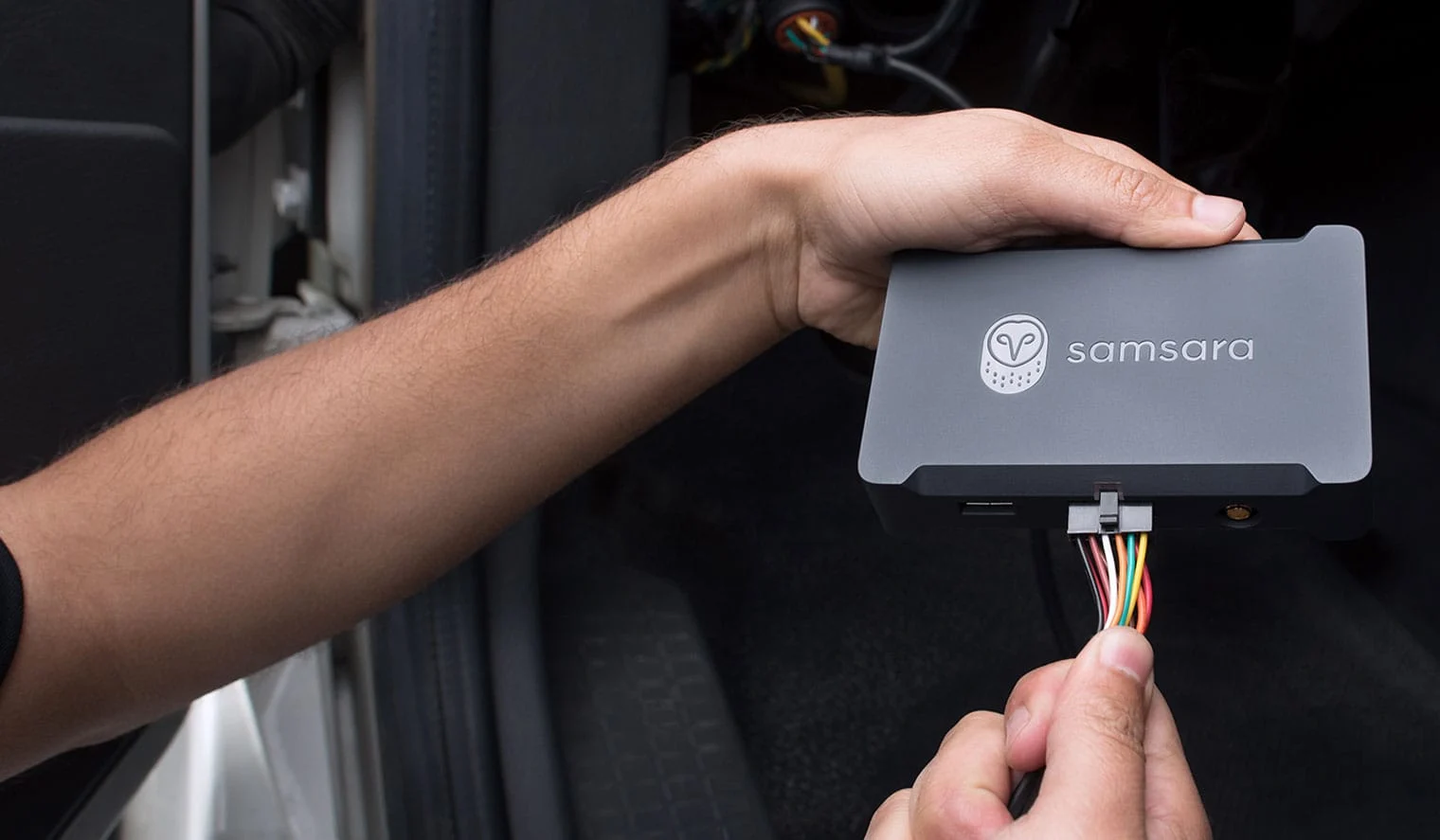
Carter Express
“Samsara increased our knowledge of what's going on with our trucks by tenfold.”
Jerry Mastin, Director of Fleet Maintenance at Carter Express
Carter Express and Carter Logistics provide their customers with supply chain solutions unparalleled in the logistics industry, and pioneered the first and largest shared milk run network in the North American automotive industry. What began in 1982 with just a few vehicles, has since grown to include over 900 trucks, 1,600 trailers, and 950 drivers. Carter relies on Samsara to streamline their operations, improve their driver experience, and increase efficiencies across their business.
Simple API integration seamlessly feeds real-time GPS data to their TMS to relieve navigation burdens and provide a strong customer experience.
Electronic DVIRs reduced time drivers spent on submitting DVIRs from 15 minutes to one, while increasing visibility into vehicle maintenance.
Geofences created an automated workflow that improved route point updates by 30%.
Meet Carter Express and Carter Logistics
Carter Express got its start as a two-truck operation running regional routes for the automotive industry. Since then, it added Carter Logistics to its family of companies and is now a high-tech, innovative supply chain business. While Carter provides services like yard management and warehousing, they’ve focused their efforts on providing automotive suppliers the first and largest shared milk run system—a delivery method used to transport mixed loads from various suppliers to multiple customers via consolidation centers. They operate over 400 of these routes a day in the US, and have expanded the program to two locations in Mexico. By enabling customers to split the cost of trucks for their shipping needs, Carter has created a service that helps customers stay efficient and economical in their logistics initiatives.
While helping their customers be efficient is a major focus for Carter, it’s equally important for their business to say efficient as well. That’s why in 2019, Carter partnered with Samsara to streamline their operations and improve efficiency for their most important assets—their drivers.
Increasing driver and dispatcher productivity with a seamless API integration
Carter is focused on getting as much pertinent information to the driver as safely and efficiently as possible. To do this, they spend a significant amount of time building and scheduling routes with their dispatch (TMS) software. While their previous telematics solution integrated with their dispatch software, it was not as user-friendly for their drivers. This kept drivers from leveraging the integration, making dispatching workflows more time-consuming.
With Samsara’s open API, real-time GPS information from Samsara Vehicle Gateways is fed directly into Carter’s TMS. Because of the user-friendly interface, Carter has found drivers use the integration at a higher-rate for things like automatic route points, bill of lading information, and more. This helps provide more streamlined information to dispatchers while also giving drivers more visibility into their workday.
“The ability to know what their day looks like makes things much more efficient for our drivers, and having that information readily available definitely makes for better productivity,” said Rick Hauser, Carter’s Assistant Director of Continuous Improvement.
“The ability to know what their day looks like makes things much more efficient for our drivers, and having that information readily available definitely makes for better productivity."
The information is critical, but the seamlessness at which drivers can receive it is even more helpful. Previously, drivers were responsible for inputting routes in their phones and uploading them to their GPS—for every single stop. With Samsara, Carter has been able to automate navigation by having all the GPS location information directly in their TMS.
“The automation behind it is huge,” Hauser said. “Now, drivers just have to push a button on the tablet and it pulls up the navigation to that next stop. We're cutting time down for them on a daily basis.”
With every stop, the automated workflow saves minutes and that saved time adds up quickly. “Minutes for a driver is huge,” Hauser said. “We might be working up to 14 hours a day—but when we start systematically putting these small things in place—suddenly they’re working 13 and a half hours a day, or 13 hours a day at the end of the week.”
In addition to improving the driver experience, Carter has been able to leverage Samsara’s API integration to increase dispatching efficiency. Before Samsara, dispatchers had to spend a large portion of their time resolving data entry issues caused by a lack of Hours of Service data and GPS location information in their TMS. Now, dispatchers have more time to invest in building relationships. “I had a group of dispatchers that spent 50-60% of their day fixing errors and doing data entry work,” said Hauser. “But now, they have more time to proactively look for loads that are running late and also develop that relationship with our drivers.”
Saving time with electronic DVIRs
While Carter’s primary use for DVIRs is compliance, they also serve as an important communication tool between drivers and staff. Additionally, they help Carter ensure their vehicles are regularly maintained and serviced in a timely manner.
Before Samsara, drivers at Carter had to complete paper DVIRs—a very manual process for both drivers and admin staff. Because the process was so time-consuming, this sometimes meant DVIRs went uncompleted. “It can be cumbersome for a driver to fill out a piece of paper, and that makes it less likely that they actually do it,” said Jerry Mastin, Carter Logistics’ Director of Fleet Maintenance.
Now, Carter uses Samsara electronic DVIRs to efficiently complete vehicle inspections and immediately inform mechanics if there’s an issue. The amount of time this has saved Carter is considerable. What previously took their drivers 15 minutes to complete, now only takes a minute or less to submit. Plus, record-keeping and back-office administration is simplified when a digital report of the DVIR is automatically created and saved in the Samsara dashboard.
“Samsara creates an online record and helps everything stay seamless."
“There's no more faxing from one terminal to the home terminal, or trying to figure out how to get those to the right people for filing,” said Nick Geesaman, Carter’s Vice President of Continuous Improvement. “Samsara creates an online record and helps everything stay seamless. We're getting better communication from the drivers because we've made it so much easier for them to have it right on their tablet.”
In addition to streamlining the submission process, Samsara DVIRs have also helped Carter gain more visibility into the health of their vehicles. “Samsara increased our knowledge of what's going on with our trucks by tenfold,” Mastin said. “I get emails about check engine lights or other issues with our trucks. Before, I wouldn't have this information until the driver told us when they brought the truck in for service. Sometimes, those issues were DOT items that needed to be corrected right away.”
With nearly a thousand drivers across their fleet, having access to data isn’t enough. It’s equally important for Carter to make sense of that data so they can act on it. To help keep DVIRs extra organized, Carter leverages Samsara tags to isolate communications from particular vehicles in specific areas. For example, fleet managers can tag vehicles that have routes in Ohio so that if a pressing maintenance issue is communicated via DVIR, Carter is better prepared to direct that driver to a nearby maintenance shop. This makes it easier for fleet managers to provide more timely and personalized communication to their drivers, instead of everything just going to one mailbox. That means the right person gets notified at the right time.
“It helps drivers feel confident that information is getting to the right people and that something's going to be done with it,” Mastin said. “It adds a level of comfort for our drivers.”
Route point update accuracy improved by 30% with geofencing
Drivers at Carter previously had to manually input data or route checkpoints into their GPS system. This not only created an extra step for drivers, but wasn’t always a dependable process either. “We were relying on drivers to create the entry,” Mastin said. “But, we found drivers were doing this only half the time.”
Instead, the work fell to dispatchers. “Drivers were manually putting their entries into our previous system about 70% of the time,” said Shane Ulery Carter’s Director of Operations. “The other 30% of the time, we had to call them and say ‘Hey, I see via GPS that you’re there—but you haven’t put your times in.’ As a result, we had to do those manual checkpoints as a dispatcher.”
"With Samsara geofencing, the driver saves and the dispatcher saves.”
Today, Carter leverages Samsara’s geofencing functionality to make this workflow automated for drivers and obsolete for dispatchers. By using Samsara geofences, Carter creates a digital perimeter around the locations a driver is responsible for stopping at along a route. When a driver drives through the digital perimeter, information—like the time and location—is automatically captured in the Samsara dashboard.
“The geofence is actualizing their stop for them; there isn’t any work required,” Ulery said. “Their requirements are just to show up and cross that geofence. This is much simpler than what they were required to do before. With Samsara geofencing, the driver saves and the dispatcher saves.”
Continuing to grow with Samsara
Carter found a partner in Samsara to help them continue to innovate at a rapid pace. While they’ve already leveraged Samsara to improve efficiencies, they’re just getting started. From fuel efficiency to coaching drivers, Carter is considering new ways to use the technology to improve their fleet operations.
Similar posts like this



